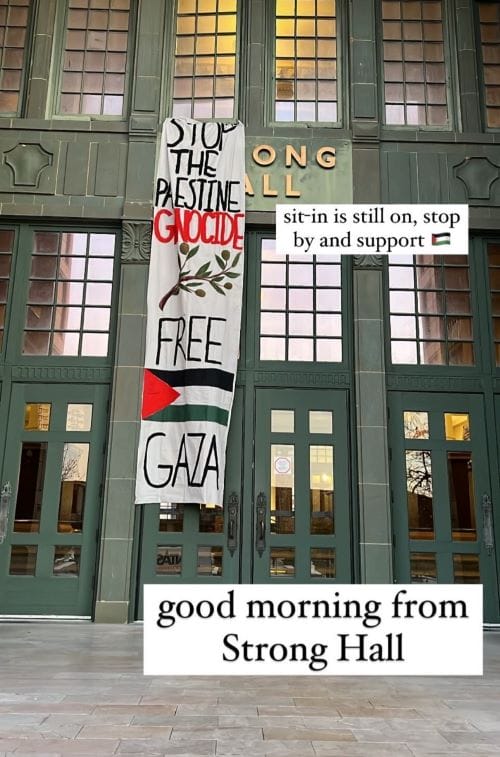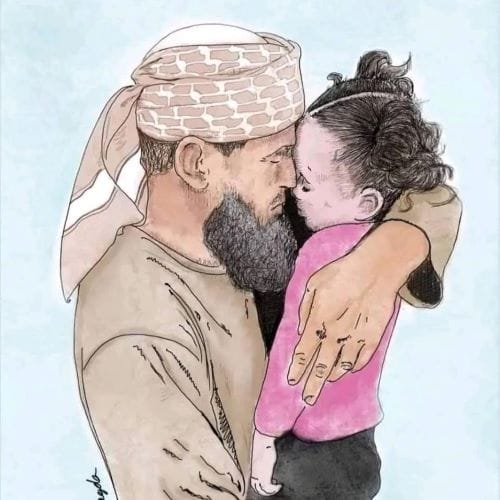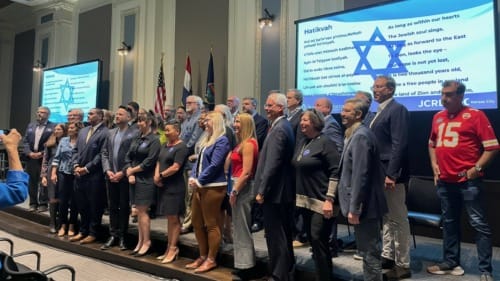Voices Speak Up for Palestinians as Israel and Hamas Battle Innocent Victims Everywhere
Published November 30th, 2023 at 6:00 AM
Above image credit: Wednesday, Nov. 29, was the United Nations' International Day of Solidarity with the Palestinian People. Multiple signs supportive of Palestinians were seen around the Greater Kansas City area on Tuesday and Wednesday. (Photo collage by Cami Koons | Flatland)The sign-up sheet for the protest outside the chancellor’s office advised the University of Kansas students: “For your security, please only list your first name.”
Nearly a dozen people volunteered for half-hour shifts outside Chancellor Douglas A. Girod’s office on Tuesday.
The plan was to arrive early, at 6 a.m., to hang banners from the bannisters of Strong Hall.
“Stop the Palestine Genocide, Free Gaza” and “Glory to the Martyred” the banners read, brightly colored with the red, black and green of the Palestinian flag.
Some KU students have been dismayed that the chancellor reached out to show support when an Israeli flag was ripped down and torn up at an off-campus fraternity but hasn’t shown what they feel is similar support for Palestinian voices.
Concern for their own safety, for confidentiality, is often part of the efforts of young adults who are speaking out in support of Palestinians in the Gaza Strip, who’ve been under attack as Israeli airstrikes have vowed to eradicate Hamas following its Oct. 7 attack on Israel.
It’s a fact-based reaction.
Elsewhere across the nation, there have been statements by faculty that college students who profess support for Palestine might not be suitable for hire in their chosen major, such as law students.
Students at the University of Missouri-Columbia were encouraged by the Mizzou Muslim Student Organization to take precautionary measures while on campus, including using the Campus Islamophobia Incident Tracker, which is recording incidents nationwide.
Last weekend in Vermont, three college students of Palestinian descent were shot. One is paralyzed and is not expected to regain the use of his legs.
A man has been charged with three counts of attempted second-degree murder. Authorities have said that they suspect it was a targeted hate crime, although that has not yet been officially charged.
Two of the injured college students were wearing black-and-white keffiyeh scarves, a common image among Palestine rally-goers.
Kansas City area supporters of Palestinians have been encouraged to wear the scarves at rallies and other public spots, especially on Wednesday.
Power of Scarves
Nov. 29 has long been sanctioned by the United Nations as the International Day of Solidarity with the Palestinian People.
Signs were hung in prominent places, like highway overpasses in the Kansas City area. One read “Stop the Genocide, Save the Children.”
At the University of Missouri-Kansas City, a banner was hung outside the student union declaring “A Free Palestine Within Our Lifetime.”
Organizers say they are encouraged, not only by the temporary ceasefire this week, but also by what they believe is a growing sense of empathy for Palestinians and those living in Gaza.
“The narrative is thankfully shifting,” said Fatima Mohammadi, a leader with Al-Hadaf KC, in a written statement. “People from all backgrounds are feeling more confident in their assessment of Israel as a colonial military project and a brutal occupier of indigenous land and people.”
Carefully Chosen Words
The words that Mohammadi uses such as “colonial” and “occupier” are part of dialogues, and arguments at times, as people are sharing their views.
Disputes are common on social media. And in public.
The Kansas City Public Library resorted to filming a presentation with two military historians and then posting it online after protesters disrupted a session intended as an informational session: “Crisis in the Middle East: Understanding the Arab-Israeli Conflict.”
Middle East Conflict in Kansas City
Some charge that what’s happening to the Palestinians is genocide. Others use the phrase ethnic cleansing. Similarly, some call Hamas terrorists, others avoid the label.
More than 14,000 Palestinians have died in the recent Israeli attacks, the majority women and children, according to reporting by the New York Times.
The firebombing in the Gaza Strip by Israeli Defense Forces began after the killing of 1,200 Israelis in the attacks by Hamas terrorists on Oct. 7.
Al-Hadaf KC has been supportive of the KU students.
The group has led many of the events in recent weeks, including car convoys, rallies, online teaching sessions on the history of the conflict and daily organizing meetings. Those efforts have pressured local members of Congress to support the ceasefire and a resolution sponsored by U.S. Rep. Cori Bush of St. Louis.
“Every action we have executed has been with the support of so many wonderful people, all focused on justice and truth,” Mohammadi said.
A meeting with U.S. Rep. Emanual Cleaver II resulted in him releasing a statement the following day, calling for a bilateral ceasefire.
Otherwise, his statement clarified a moderate position, reiterating his stand against “Hamas terrorists,” the right for Israel to exist and defend its people, while also decrying the rise in both Islamophobia and antisemitism.
“My hope is that this ceasefire will enable the difficult but necessary work of a negotiated, durable agreement to move forward and provide a framework for long-term peace and a two-state solution — something that I strongly support,” Cleaver’s statement read, in part.

Efforts to gain a statement from U.S. Rep Sharice Davids are ongoing.
No resolution has been reached at the University of Kansas.
The students, largely organized under the Muslim Student Association, are adamant in their demand, punctuated by the sit-in and two walkouts from classes.
One statement posted online: “Rather than releasing a statement, addressing the university as a whole, the chancellor has invited a select few to have a meeting with him.
While we appreciate this effort in communication, it is not enough. It is not what we asked for. We do not need quiet condolences given in small, private rooms, we need solidarity and support in front of the world.”
Jenna Ghannam, president of the Muslim Student Association, is an organizer of the actions.
Ghannam challenged both the university and the mayor of Lawrence, asking for the city to use its voice to call for a ceasefire.
But the request didn’t find acceptance from the mayor, who pushed back that calling for a ceasefire isn’t city business.
Yet elsewhere, city-to-city relationships have been tapped.
Leawood has long been a sister city to the Gezer Region of Israel.
In mid-November, the Leawood City Council approved a $25,000 donation to build a bomb shelter for kindergarteners in Gezer, according to reporting by the Kansas City Jewish Chronicle.
Similarly, Kansas City’s dozen sister city relationships includes one with Ramla in Central Israel.
As a result, the Israeli flag is part of the sister cities display on a bridge on the Country Club Plaza. The flag had to be replaced in October after it was torn down.
The desecration of flags fueled some of the disputes at KU.
White flags had been set out to honor killed Palestinians on a campus library lawn. But after some were torn out, student activists wanted a statement from the administration.
The mediation arm of the Department of Justice, the Community Relations Service, is reportedly looking into offering its services to the students and the administration at KU.
If You See Something, Say Something
Her name was Reem. She was 3 years old.
The little girl’s image, her lifeless body held and caressed by her grandfather, is the Facebook profile picture of Mahnaz Shabbir.
It’s a drawing, taken from the viral video of the two together, an innocent child among the thousands who have died as Israeli forces began launching airstrikes into Gaza, intent on eradicating Hamas.
“He’s holding this dead child in his arms and just kissing her and kissing her because that’s what he would do when she was alive,” Shabbir said.

As a Muslim of Indian descent, Shabbir, of Parkville, knows that she’s in a different space than many college students and young adults who are speaking out.
She’s retired, a former hospital executive with a lengthy track record in diversity work and civic engagement in the Kansas City area.
“I’m going to speak out about it because of the atrocities that are happening and the lies,” she said.
Like organizers in Al-Hadaf KC, she notes how little information is in the media about the Palestinian prisoners who are being released, in exchange for the Israeli hostages.
To her, it’s as if the lives of the Israeli’s who were held hostage are viewed as more valuable.
Still, Shabbir chooses her words carefully.
Her criticisms are kept to the actions of the Israeli government, and her own, noting the U.S. funding that goes to the Israeli defenses.
She is clear not to blame Jewish people, or religion.
“I will stand shoulder to shoulder with any of my Jewish friends if they ever felt that they were having an antisemite attack them,” Shabbir said. “I will fight with them. I will support them.”
Still, many of her Christian friends have reached out for information and guidance on the recent events. And she feels certain that awareness of the plight of Palestinians has been broadened in the last two months.
Shabbir’s stands on Middle East conflicts are not new postures, but ones that she’s been advocating for nearly two decades.
“I’ve been saying the same thing, that basically both sides need to stop,” she said. “But now, it’s as if the Band-Aid has been ripped off.”
She’s careful there as well, investigating, waiting to verify what others so casually spread on social media.
For instance, she questioned the early accounts of Jewish babies decapitated by Hamas. She’s still wanting more verification that Israeli women were raped before they were killed during the attacks on Oct. 7.
Reem’s death, in Southern Gaza, was substantiated with further reporting by CNN.
An interview was conducted with Reem’s grandfather as he prepared her body for burial and that of her 5-year-old brother, also killed in the airstrikes.
Overall, Shabbir said that she’s proud of the activism she’s seeing on college campuses, and in general, from younger people.
“They are seeing the injustices,” she said. “This is what we taught our kids, to say something if you see something. And they are doing it.”
Mary Sanchez is senior reporter for Kansas City PBS.



